AFFOGARE NELLE BUGIE
04.10.2024

Una Dea del mare che affoga nel gas naturale liquido1Un muro di fiamme e un gruppo di misteriosi rappresentanti dell'industria petrolifera e del gas: Ocean Rebellion crea uno spaventoso quadro di dolore per evidenziare il greenwashing dell'industria petrolifera. Gas naturale liquido (GNL) da SEA-LNG e alcuni Stati membri del Organizzazione marittima internazionale delle Nazioni Unite (IMO).
Accanto al Memoriale internazionale dei marittimi sull'Albert Embankment, i nostri artisti hanno presentato una nuova e sorprendente performance volta a far luce sulla grave crisi che attanaglia l'industria navale.
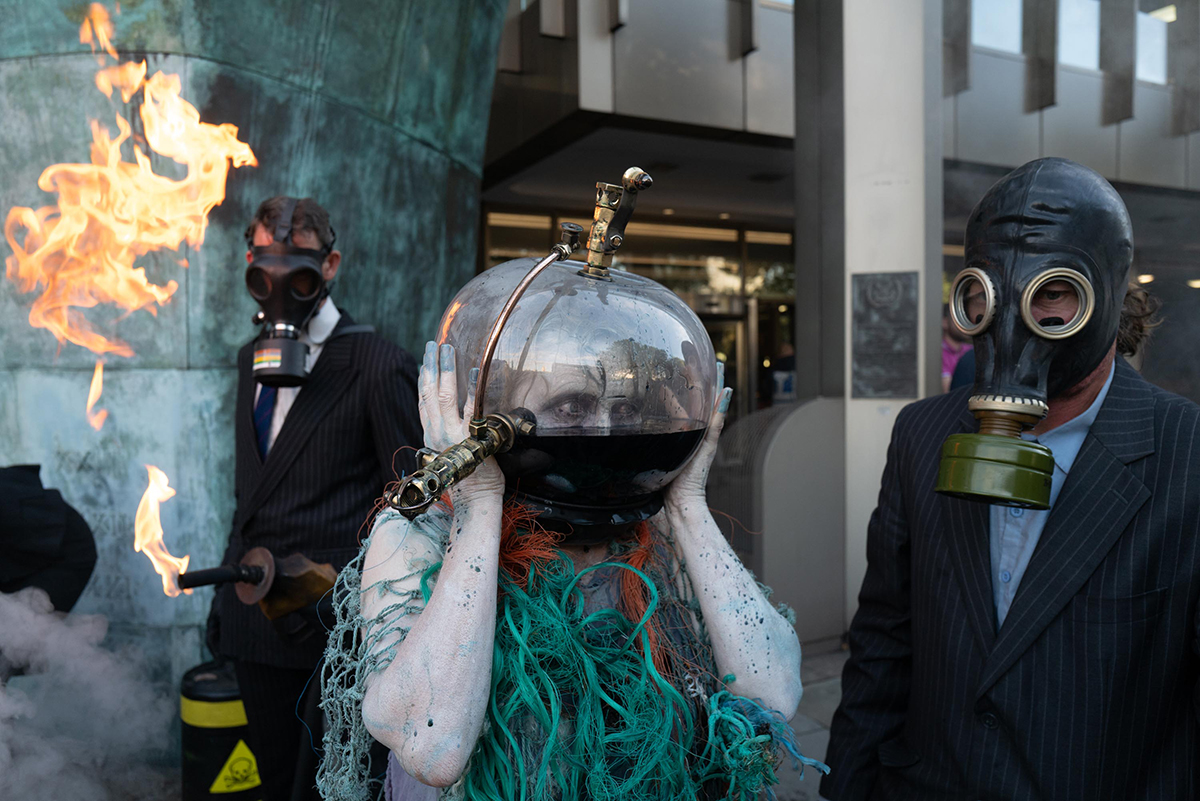
⬆️ Mentre l'elmetto si riempie, la Dea muore. Le sporche menzogne di LNG stanno facendo precipitare l'IMO in una autostrada per l'inferno. Foto João Daniel Pereira.
Il fulcro della performance è stato l'"annegamento" di una dea oceanica, la cui testa è stata catturata all'interno di un casco traslucido, una prigione a forma di boccia per pesci che si riempie lentamente di morte. Figure con maschere antigas provenienti da Shell LNG, membro di SEA-LNG, hanno utilizzato dei macchinari per riempire lentamente il casco di GNL, sommergendolo. Ai lati, getti di fiamme e petrolio eruttavano da ugelli branditi dai dirigenti di Oil and Gas. L'esibizione è culminata con la completa sommersione della dea, un atto d'accusa contro l'incapacità dell'IMO di proteggere gli oceani, la loro continua manipolazione da parte dell'industria dei combustibili fossili e del trasporto marittimo e un preludio toccante alla giornata conclusiva dell'evento. MEPC82 incontri.
Il destino dell'Oceano dipende da tutti noi.
I nostri interventi dipendono dal vostro sostegno.
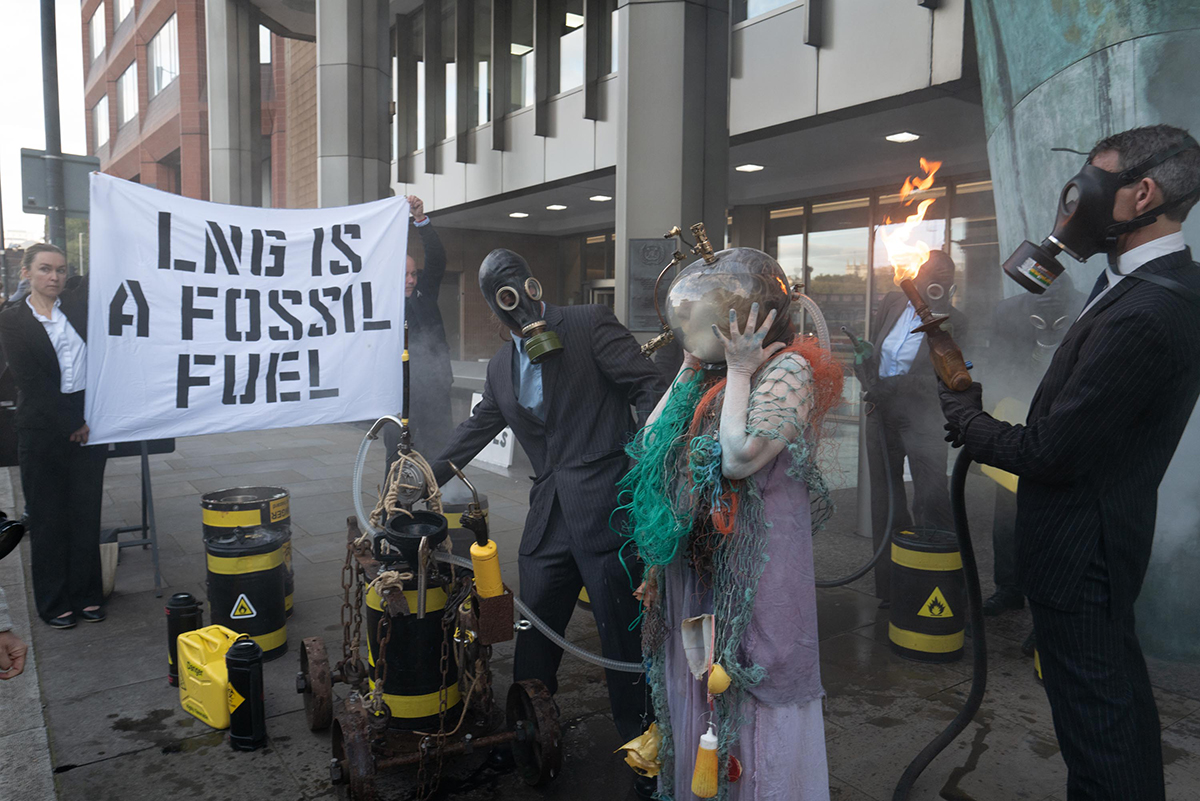
⬆️ Il GNL è un combustibile fossile, è così semplice. Foto João Daniel Pereira.
Nascondendosi dietro i rapporti sul bioLNG, SEA LNG ha avuto molto successo nel vendere il GNL come combustibile verde, anche se il GNL biologico è costoso e raro (il GNL fossile è il gas preferito) e provoca comunque un'eccessiva riduzione dei consumi. emissioni di metano in tutto il suo catena di approvvigionamento e utilizzo.
Il loro successo è stato tale che aziende come Maersk, Royal Caribbean, e MSC sono stati promuovere le loro navi come "verde" e vendendo questa menzogna al grande pubblico. Il GNL non è un carburante verde. Inoltre, l'IMO è convinta di questa menzogna e non sta facendo nulla per impedire che il GNL diventi il combustibile fossile preferito dalle navi. Nella sola Unione Europea, il consumo di GNL da parte delle navi è raddoppiato da 2,2 milioni di tonnellate (Mt) nel 2018 a 4,4 Mt nel 2022. L'adozione del GNL si basa sull'idea ingannevole che si tratti di un carburante alternativo e pulito. È qui che i sostenitori del GNL sono impegnati in un'operazione di gaslighting, ingannando il settore marittimo e tutti noi.
Il gaslighting è una forma di manipolazione psicologica utilizzata per far dubitare delle proprie percezioni e della propria sanità mentale, spesso distorcendo i fatti o la realtà. I fan del GNL utilizzano tattiche di gaslighting, come il finanziamento di ricerche e la citazione selettiva di studi che supportano la loro narrazione. screditando i ricercatori che evidenziano i rischi del GNL.. Inoltre, stanno minando le voci dissenzienti della comunità e gli opinionisti etichettandoli come "allarmisti" o "ostruzionisti".
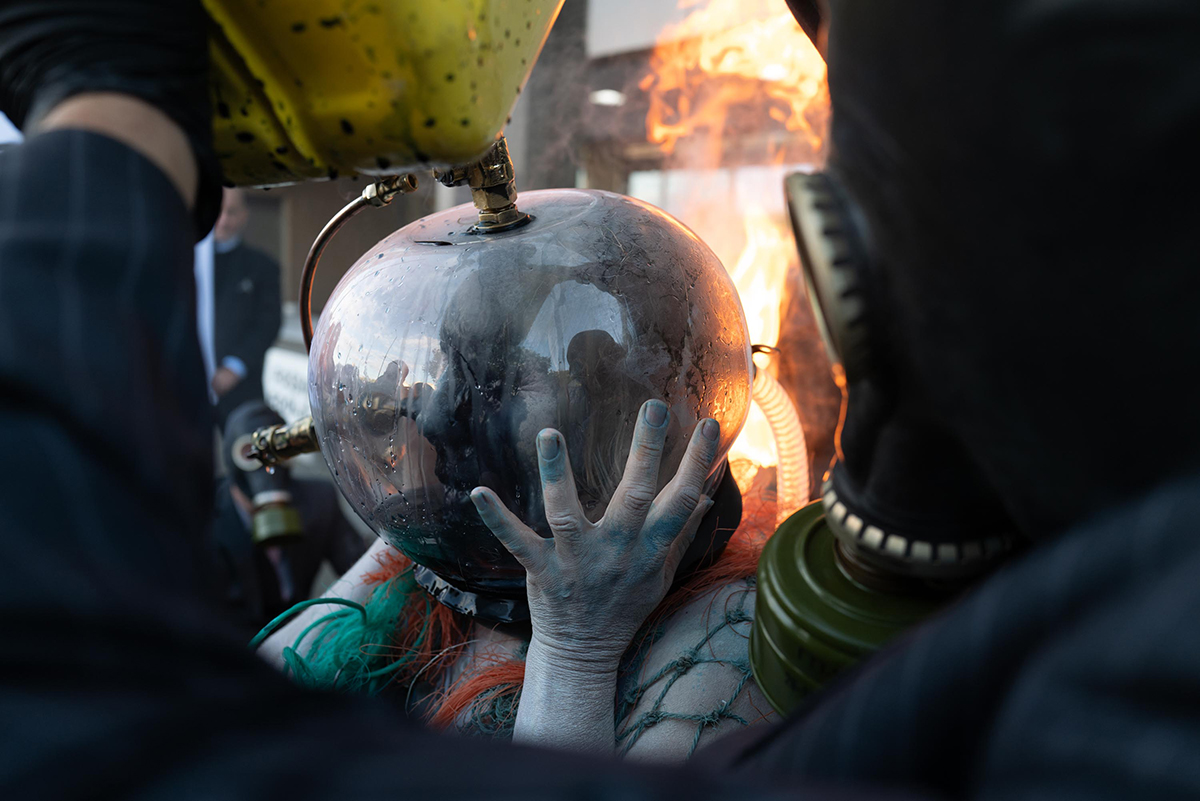
⬆️ Gaslighting di SEA-LNG è fuorviante e potenzialmente illegale per i membri, date le recenti regole della FCA che richiedono I servizi sono descritti con precisione. Foto João Daniel Pereira.
Essendo membri di SEA-LNG aziende come Shell LNG, Lloyd's Register e Maersk sono impegnate in un'azione di "gaslighting", pur facendo dichiarazioni di sostenibilità. Ciò può costituire una violazione delle loro responsabilità legali agli azionisti e rischiano un contenzioso se tali rischi materiali, compreso il rischio di contenzioso, non sono adeguatamente riflessi nei loro bilanci certificati. Allo stesso modo, agenzie di rating del credito che non riescono a individuare questo greenwashing, non riescono nemmeno a dare una lettura accurata della sostenibilità ai loro abbonati nel settore finanziario.
Per non parlare del mancato rispetto delle responsabilità etiche nei confronti dei più ampi portatori di interesse, per evitare il collasso del clima, della natura e della società a causa delle emissioni di metano e di carbonio fossile che derivano dal GNL. Lungi dall'essere pulito, il GNL è uno dei combustibili più sporchi che esistano. Spacciarlo per un combustibile pulito è una menzogna tecnologica.
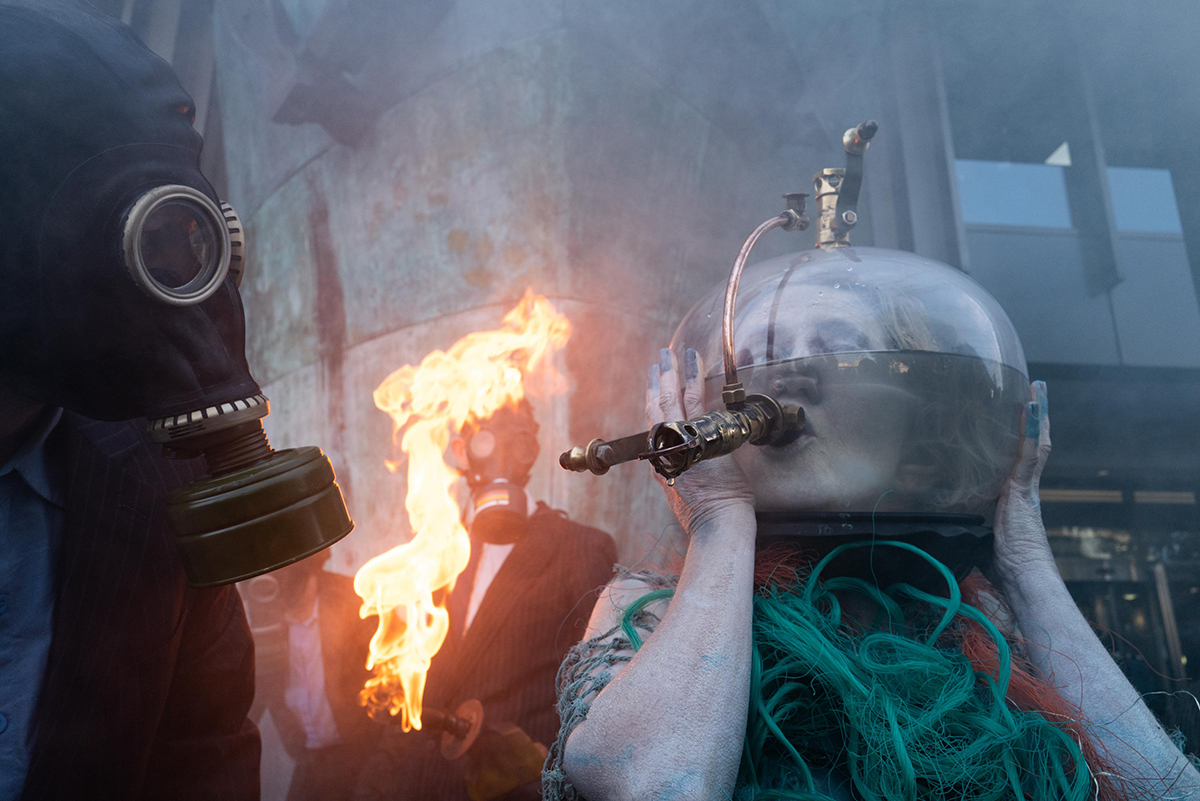
⬆️ La Dea del mare esala l'ultimo respiro prima di soccombere alla miscela tossica di GNL fossile e bio. Foto João Daniel Pereira.
Gas naturale liquido (LNG) - i fatti
Il GNL è un combustibile fossile che, quando viene estratto, trasportato e bruciato come combustibile marino, rilascia nell'atmosfera il metano, un pericoloso gas che provoca il riscaldamento globale e che è più che sufficiente a ridurre il consumo di carburante. 80 volte in più di riscaldamento climatico a breve termine rispetto all'anidride carbonica.
Il Gruppo intergovernativo di esperti sul cambiamento climatico (IPCC) delle Nazioni Unite identificato una rapida riduzione delle emissioni di metano come una delle principali priorità per limitare il riscaldamento globale a un valore il più possibile vicino a 1,5°C. Il rapporto dell'IPCC ultimo rapporto concentrandosi sulla mitigazione del clima chiarisce che il gas fossile sotto forma di GNL non è una soluzione per la decarbonizzazione del trasporto marittimo.
Contrariamente a quanto richiesto dalla scienza del clima, le compagnie di navigazione e portuali hanno proceduto a pieno ritmo nella direzione sbagliata, investire pesantemente nel GNL fossile, sostenendo che il carburante ridurrà il loro impatto ambientale e l'inquinamento climatico. Attualmente sono in ordine oltre 785 nuove navi da carico a livello globale, di cui oltre 400 sono state costruite per funzionare con GNL fossile.
Bruciare più GNL fossile a bordo delle navi è un disastro in divenire per il nostro pianeta. Non farebbe altro che aumentare le emissioni di metano dalle navi, che già rosa di 150% tra il 2012 e il 2018, secondo l'Organizzazione marittima internazionale (IMO) delle Nazioni Unite.
Le emissioni di metano riducono anche la qualità dell'aria e l'aumento della domanda di GNL, anche nel settore marino, comporta impatti negativi sulla terraferma, come l'inquinamento dell'acqua potabile, la riduzione della produzione agricola e l'aumento dei tassi di mortalità prematura.

⬆️ Un dirigente mascherato di Shell LNG dimostra come Le combustioni di GNL avvengono (sempre) utilizzando una pompa dell'olio. Foto João Daniel Pereira.
Servono norme forti sul metano all'IMO
Secondo il IPCC (AR6)Per affrontare l'emergenza climatica e i suoi impatti devastanti sulle persone è necessario affrontare con urgenza le emissioni di metano nel breve periodo. I sostenitori del GNL stanno ingannando i politici sulle reali dimensioni dell'impatto climatico e sanitario del GNL, mettendo a rischio un futuro vivibile su questo pianeta.
L'Organizzazione marittima internazionale è l'organismo delle Nazioni Unite che regolamenta la navigazione internazionale. Attualmente non esistono normative internazionali specifiche per le emissioni di metano delle navi.
Invito all'azione presso l'IMO:
Il GNL è un combustibile fossile che ha un impatto negativo sulle persone, sull'ambiente e sul clima in ogni fase del suo ciclo di vita.
Noi chiediamo:
1. Gli Stati membri dell'IMO riconoscono questo dato di fatto e smettono di ascoltare i SEA LNG lobbisti.
2. Tutte le aziende coinvolte nella promozione del GNL vengono esaminate per stabilire se ciò costituisce una violazione degli obiettivi di sostenibilità ambientale.
3. L'IMO per promuovere l'efficienza e l'uso di imbarcazioni a vela e a propulsione elettrica incentivando l'adozione nel settore del trasporto marittimo, responsabilizzando e qualificando i lavoratori e introducendo rotte di trasporto più eque.
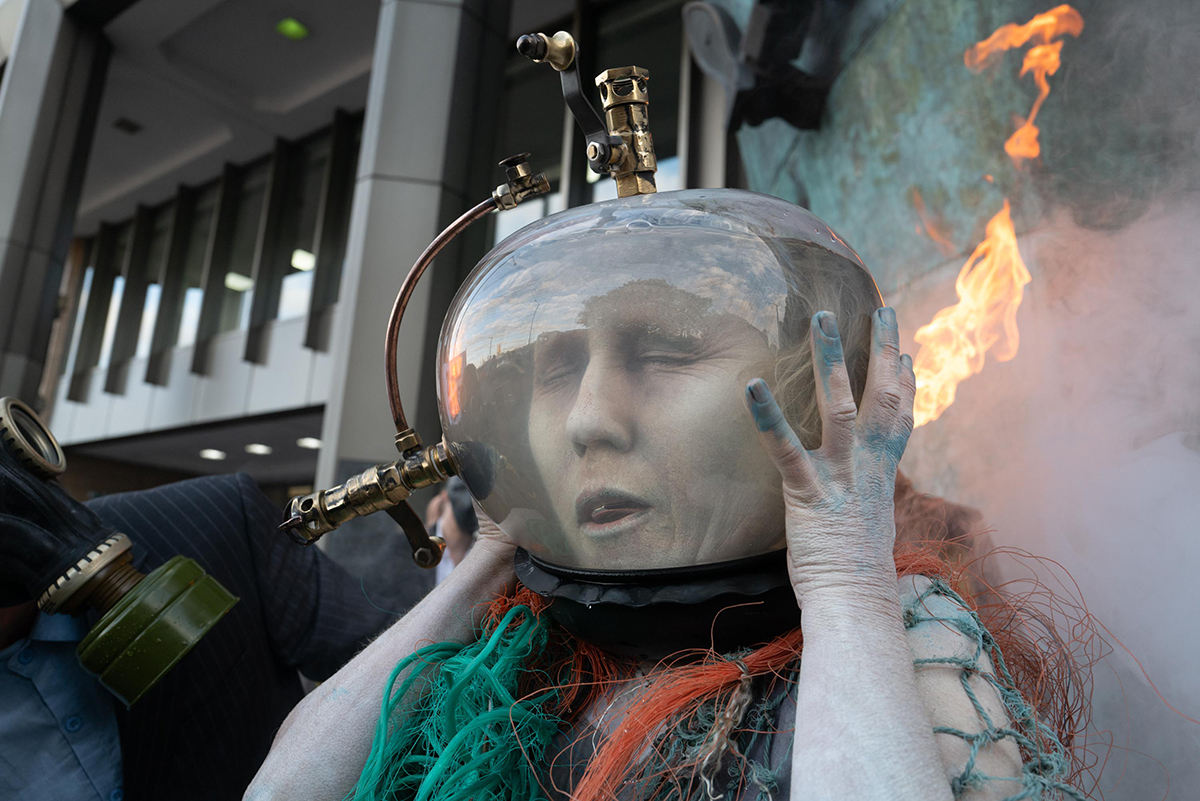

⬆️ Il mondo sta morendo sotto i nostri occhi. Foto João Daniel Pereira.
1. A differenza di SEA-LNG, noi non mentiamo su ciò che facciamo. Non abbiamo usato il GNL per annegare la Dea del Mare - sarebbe stato un omicidio. Abbiamo invece usato acqua innocua.